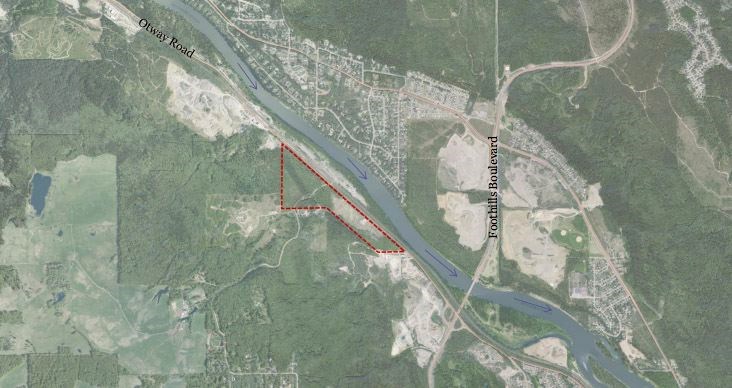A marathon city council meeting Monday night brought out more than 150 residents, many who listened the full four hours as passionate advocates pushed for either side of a rezoning application.
Timber West Mill Construction and CIF Construction’s request for the city to name a nearby property on Otway Road “light industrial” has galvanized residents who argue their move and that designation will create noise and light pollution, is a threat to the Nechako River aquifer, and sets a poor precedent that leads to unsightly industrial sprawl.
By 11 p.m., four hours into the public hearing, city council voted to listen to the remaining speakers at the next meeting on May 9, with time for councilors to think clearly and address the issue. Even before the meeting started, the package for this item alone offered hundreds of pages of letters and powerpoint slides from both sides, with dozens more trickling in, in the hours and days before council.
“This is a difficult process,” said Mayor Lyn Hall to close the meeting. “We don’t want to cut anyone short. I certainly don’t want us as a council to be making any decision on the fly… I think we need to be on top of our game.
“There could be extensive debate.”
Each side argued over the significance of the two businesses relocation, roughly 100 metres south of its existing spot.
But, even that detail was disputed, with residents across the river showing on a map that it would actually bring the company about 400 metres closer to their view. Councillors listened as both offered allegations that the other side was misleading.
After both owners made their case, the first speakers in opposition - Adrian Wilson, supported by William Alsip – took more than an hour to try and rhetorically tear it down, prompting Coun. Terri McConnachie to ask for a time estimate. Wilson painstakingly went through dozens of complaints, ranging from environmental and aquifer concerns to the fear of further development and company growth.
Several of the night’s speakers asked why this land, arguing the city has plenty of industrial land to offer. But the proponents said the majority of land of that designation is under five acres and not suitable for the applicants.
“There is not a surplus of industrial land in this community,” said David McWalter, a consultant and engineer working for the two companies, instead calling it “limited.”
Still, others argued there is nothing unique about this particular parcel of land that should outweigh residents concerns.
“I have heard no single valid reason to locate these companies specifically at Otway Road," said Jeff Northrop, the second presenter, to applause. By his count residents petitioners, residents opposed outweigh residents in support by “an overwhelming ratio of 20 to one.”
“We as a community are not anti-industrial,” said Northrop; homeowners just want them in an appropriate zone.
In an effort to appease residents, the companies said they would give the remaining 38 acres of land to the city.

“During the last few days it’s become abundantly clear that words are not enough,” said Ashley Elliott, of L&M Engineering Limited, before the remaining area – some 56 per cent – for the city’s use.
McWalter called it a “generous gift” while Wilson said it was a tactic to buy favour – and given the cost of industrial land, the two stand to benefit to the tune of millions of dollars.
“They want that cheap land and they’re trying to buy us now with free property,” Wilson said.
McWalter later stressed the two were neighbours not land speculators - after opponents suggested as much - and said the move would attract that sort to seek out non-industrial land at a cheap rate and then rezone it.
Both owners – Timber West’s Ed Ridley and CIF’s Jack Fomenoff – established their long community connections and family history, which Wilson mocked as a framing tactic.
“All we’re asking is for an opportunity to better ourselves,” said Fomenoff, who said his company has a strong record with health and workplace safety.
After nearly two decades on the nearby location, both have proved to be good neighbours, Elliott said.
“During this time they have not generated a single noise” traffic or aesthetic complaint, she said. She pointed to early consultations in November and efforts since then to address resident concerns, including building a berm to screens their work yard from view, moving its proximity to the aquifer, the land donation and other restrictions built into the application that mean the companies could use only eight of a possible 46 uses under the light industrial designation.
Jim Burbee, a 35-year resident, advocated for a neighbourhood plan so that such issues don’t come up again. The proposed development is incompatible with the adjacent residential areas and there are better alternatives available, he said, to putting more industry in the area.
“You can see we’re a little gun shy. We’re surrounded by this stuff… They are literally in the face of our neighbourhood,” Burbee said.
Elliott used that reality to argue the area was already industrial – and this particular site was “almost entirely surrounded on all sides” by other industrial users.
But, Wilson countered that point, using a zoomed-out map, it makes up a small “industrial nodule” and instead shows more nearby residential areas and parkland.
“That’s a significantly more green landscape than the proponents like to paint,” he said.
Allowing the one residential designation will allow future companies “to use the precedent of industry to justify more of the same,” Northrop said later.
"There can be no win-win. There’s only win-lose and you can guess which one is the loser here,” Northrop says.



